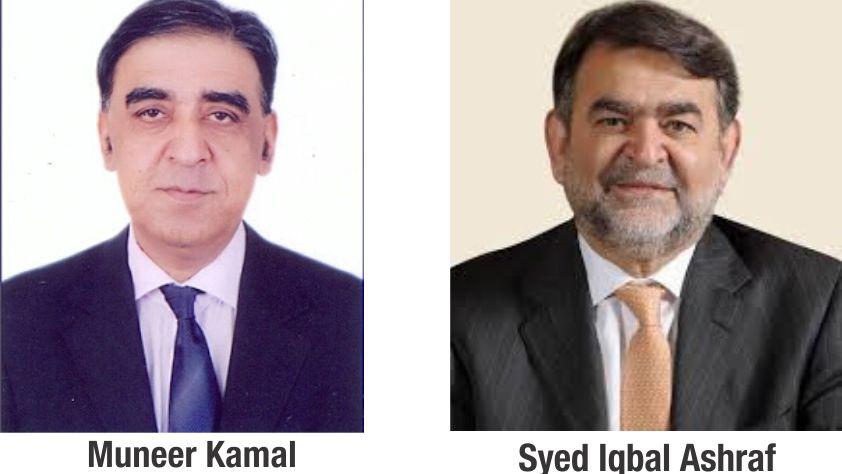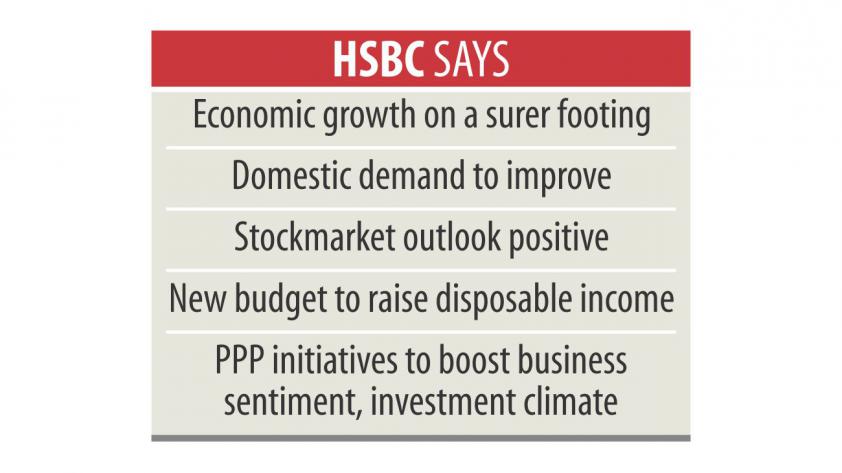Banking giant HSBC is optimistic about Bangladesh's economy as the country returned to normalcy after turbulent times earlier this year.
“As political tensions ease, it is time to focus on Bangladesh's economic fundamentals,” HSBC said in a report, “Bangladesh: Getting back to business”.
Before the June 30 upgrade, HSBC was negative on the Bangladesh equity market owing to a deteriorating investment sentiment brought about by protracted political unrest.
With the return of normalcy, it upgraded Bangladesh to “positive” from “negative”.
HSBC identified five factors that will determine the course of Bangladesh equities: macroeconomy, remittances and garment exports, domestic demand, banking sector and stockmarket.
On macroeconomic stability, it said the growth looks on a surer footing. “Bangladesh is best placed as compared to Vietnam and Sri Lanka.”
HSBC economists remain optimistic and are looking at above 6 percent growth in the current and next fiscal years.
The British bank is optimistic about Bangladesh's trade sector despite the slow pace of export growth in the last few months.
Exports rose 3.35 percent to $31.2 billion in the just concluded fiscal year, according to an official of Bangladesh Bank.
“While several risks remain for Bangladesh garment exporters, we like the long-term potential of the sector. With the blockade over, we expect to see business return to normal, especially for the garment manufacturers, the largest export sector,” HSBC said.
Inward remittances are strong.
Bangladesh received a record $15.3 billion in remittance from expatriates last fiscal year. Remittance for fiscal 2014-15 recorded a 7.5 percent rise from the previous year, according to Bangladesh Bank.
HSBC said increased earnings from exports will feed into disposable income channels, which should lift domestic demand and in turn help domestic sector earnings.
HSBC economists expect private sector consumption growth to remain on an upward trajectory in the next two fiscal years, after slumping to below 4 percent in fiscal 2013-14.
The analysis termed the fiscal 2015-16 budget to be business-friendly, as there is much in the budget that could help investment.
Increasing participation by the private sector is another priority. “We think public private partnership initiatives will boost both business sentiment and the investment climate.”
The fiscal 2015-16 budget will boost disposable income as the threshold for tax-free allowances for individuals will rise to Tk 250,000 from Tk 220,000.
“This, along with a steady flow of remittances, should push up domestic demand.”
HSBC sounded out a note of caution as Bangladesh has a history of under-utilising budget funds in the Annual Development Programme.
While the country's macro health remains sound, private sector credit growth needs to improve, it said. “We believe that the declining interest rate on bank lending should provide an additional catalyst.”
In addition, inflation has remained moderate. With transport blockades now over, businesses will no longer face supply disruptions, which should help keep prices in check.
Foreign currency reserves also climbed to an all-time high of $24 billion in April. At this level, the reserves can fund 7.1 months of import bills, up from 6.4 months at the same time last year.
On the foreign exchange front, the taka should be the least-volatile frontier market currency during any rate hike by the US Fed, said the analysis.
HSBC's FX team argues that, of the three frontier economies, Bangladesh has the strongest fiscal position, most robust external balance sheet and the best credit rating.
On the banking sector, HSBC said the outlook is improving.
The banking sector has struggled with high levels of non-performing loans in the last couple of years, as political turmoil around the 2014 election dented the debt-servicing capacity of many large borrowers.
“The good news is that things are starting to improve.”
Non-performing loans or NPLs declined to 9.7 percent as of December 2014, down from 11.6 percent in the third quarter of 2014, and stayed at the lowest level in the last two years.
However, NPLs in government banks are still high (22.3 percent) and need to come down to support any meaningful sector recovery.
Bangladesh Bank launched a large loan restructuring policy for big corporate houses with debts of Tk 500 crore or higher.
“The policy is in line with international best practices and ensures operational continuity for corporate houses that faced losses due to political disruption last year. That said, it is also important to guard the banking system against habitual defaulters, who might try to use this facility.”
Apart from lower NPL ratios, another positive development is the decline in interest rates. The banking sector is flush with liquidity: the loan-to-deposit ratio declined from over 80 percent in 2012 to 74 percent.
Lower interest rates will push up credit growth and improve the banks' LDR and the investment climate, it said.
Corporate earnings have been under pressure lately due to the political unrest since January 2015.
The recent first quarter results reflected the overall weakness. Sales growth for the DSE30 index constituents came in at 3.5 percent year-on-year in first quarter of 2015, down from 12.4 percent year-on-year in the fourth quarter of 2014.
Operating income growth also fell from 4.6 percent in the fourth quarter of 2014 to 3.9 percent in the first quarter of 2015.
“Now, with a calmer political environment, inflation coming down and more business-friendly measures by government, we expect earnings to turn around. Of course, a stable political environment remains a prerequisite for better corporate sector growth.”
Another factor making the Bangladesh market look more promising is declining equity valuations, according to the HSBC analysis.
The equity market is trading at a 12-month trailing price-earnings ratio of 15.8x, which is below the five-year average. Some of the positive sentiment is starting to be reflected in the equity market, which is up 1.3 percent month-on-month.
HSBC believes that the outlook is favourable, especially as the daily turnover has improved. The 20-day average daily turnover has climbed to $90 million from below $50 million just a couple months ago.
“Overall, the broader picture looks encouraging for the Bangladesh equity market. Peace has returned to the streets, market liquidity has jumped, valuations have come down, the investment climate has improved, the external sector outlook is balanced, the banking system is on the mend, and domestic demand looks set to improve,” HSBC said.
News:The Daily Star/7-Jul-2015






